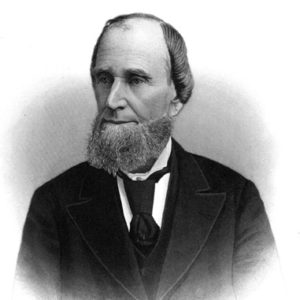calsfoundation@cals.org
Elbert Hartwell English (1816–1884)
Elbert Hartwell English was one of the most important jurists in Arkansas across a crucial period of legal development and turmoil in the state, including the eras of the Civil War and Reconstruction. In addition to his years of private practice, English served as chief justice of the Arkansas Supreme Court for a total of twenty years, one of only four chief justices to have served over twelve years in the role.
E. H. English was born on March 6, 1816, to James English, who was a planter, and Nancy McCracken English in Madison County, Alabama. The family moved to Limestone County, Alabama, and eventually included ten children. English was educated in local schools and through private tutelage. He lived in Athens, Alabama, until the age of twenty-eight. In his twenties, he read law, the method by which one could enter the profession, under future governor of Alabama George H. Houston. He joined the Alabama bar in 1839 and practiced law in Athens for nearly five years. While pursuing his legal studies, he won election to the Alabama state legislature.
Shortly after joining the bar, English married Julia A. Fisher; they had three children.
Despite his early successes in Alabama, English relocated to the young state of Arkansas to pursue further success. In 1844, he went into legal practice in Little Rock (Pulaski County) with Solon Borland, and they co-edited the Democratic Arkansas Banner newspaper. English juggled newspaper work, private legal practice, and the position of reporter of decisions for the Arkansas Supreme Court. After a short period, he gave up the newspaper field to pursue law exclusively. He served as court reporter for nine years, which gave him a deep and intricate knowledge of the Supreme Court and its workings. This led to his appointment by the Arkansas General Assembly to create a digest of laws, better known as English’s Digest of Laws, which was published in 1848 and served as the standard compendium for Arkansas for a decade.
In 1854, English was elected to the position of chief justice of the Arkansas Supreme Court. He held this position until 1864, when the temporary collapse of state functions late in the Civil War ended his first period on the court. He then resumed private practice in Little Rock until his re-appointment as chief justice in 1874. That re-appointment came as part of the conclusion to the Brooks-Baxter War that effectively ended Reconstruction in Arkansas in a protracted, tense, and violent struggle over who had won the governorship of the state. As part of their efforts to purge Republicans and allies of Brooks from all positions of power, the camp backing Elisha Baxter impeached the sitting chief justice and several associate justices. Ultimately, they secured the governorship for Baxter in 1874, along with control of most state offices. English accepted his former position as chief justice, in which he served until his death a decade later.
English’s wife died in 1871 in Little Rock. The following year, he married Susan A. Hobson Wheeles, a widow; they had no children together.
Beyond his professional pursuits, English remained active in both the Methodist Church and the Masons. He served as one of the highest leaders in Arkansas—Masonic Grand Master—for a decade. English and his fellow Arkansas Masons spearheaded the creation of the first chartered college in the state, St. Johns’ College, in Little Rock. The institution opened its doors in the fall of 1859. However, the disruption of the Civil War combined with the financial collapse it engendered effectively bankrupted the school, which, despite some efforts to sustain it, closed for good in 1882.
English died on September 1, 1884, while vacationing in the mountains near Asheville, North Carolina, and is buried at Mount Holly Cemetery.
For additional information:
“Elbert Hartwell English.” Find-a-Grave. https://www.findagrave.com/memorial/7573549# (accessed March 16, 2018).
Hallum, John. Biographical and Pictorial History of Arkansas. Vol. 1. Albany, NY: Weed, Parsons, and Company, 1887. Online at https://archive.org/details/biographicalpict01hall (accessed March 16, 2018).
Looney, J. W. Distinguishing the Righteous from the Roguish: The Arkansas Supreme Court, 1836–1874. Fayetteville: University of Arkansas Press, 2016.
Onofrio, Jon. Alabama Biographical Dictionary. New York: Somerset Publishers, 1998.
Speer, William S. Encyclopedia of the New West. Marshall, TX: The United States Biographical Publishing Co. 1881.
James Tuten
Juniata College
 Civil War through Reconstruction, 1861 through 1874
Civil War through Reconstruction, 1861 through 1874 Law
Law Elbert English
Elbert English 




Comments
No comments on this entry yet.